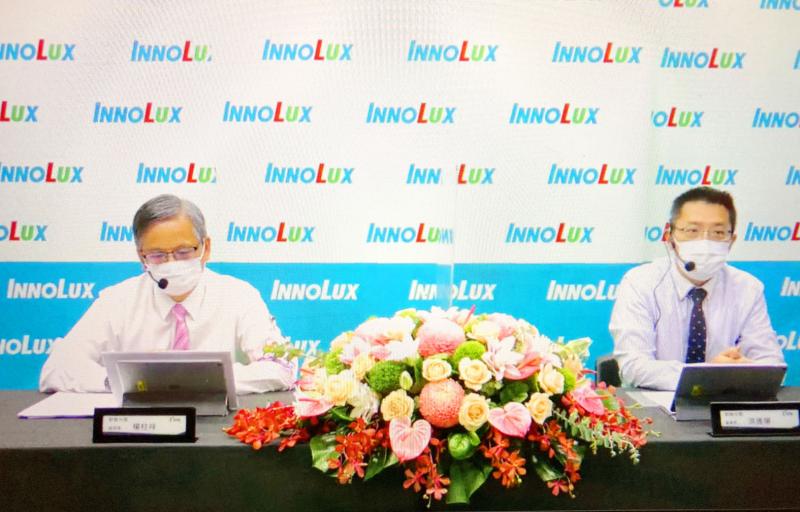LCD panel maker Innolux Corp (群創) yesterday said it was cautiously optimistic about second-half prospects as an imminent glass substrate supply constraint and an ongoing chip shortage would curb supply and avert a glut.
The supply of glass substrates might start declining this month at the earliest, as some manufacturers commence annual factory maintenance, the Miaoli-based company said.
“We believe this should help ease industry concern over a supply-demand imbalance as some capacities, which are used to make panels for monitors, notebooks or TVs, would be down,” Innolux president James Yang (楊柱祥) told an investors’ teleconference.

Photo: Lisa Wang, Taipei Times
The reduced supply would cut flat-panel production by about 360,000 units, Yang estimated, adding that a glass substrate supplier has said it plans to cut utilization by 15 to 20 percent.
Because of reduced glass substrate supply, “we are cautiously optimistic about the second-half market situation,” Yang said. “Market demand remains strong.”
Innolux forecast that shipments of panels for computers and TVs would grow by a low-single-digit percentage sequentially this quarter, benefiting from back-to-school and return-to-office demand for commercial laptops and monitors.
Average selling prices would climb by a low-single-digit percentage during the same period, it said.
Asked about Innolux’s long-term supply agreement with Chinese panel maker Sakai SIO International Guangzhou Co, company chairman Jim Hung (洪進揚) said the deal would boost the company’s output by about 2 to 3 percent next year.
Based on the agreement, Innolux would make a prepayment of 4 billion yuan (US$618.4 million) this year and next year to secure 65-inch and 75-inch TV panels from SIO’s G10.5 plant during the 2022-2033 period.
Innolux expects the strategic partnership to lift its profit margin, as G10.5 has a cost advantage over Innolux’s G6 and G8.5 factories in producing large TV panels, Hung said.
Innolux and local rival AU Optronics Corp (友達光電) do not operate G10.5 fabs, as the two have long decided that they would not join the capacity expansion race with Chinese rivals, but would rather focus on boosting their products added value.
Innolux’s net profit last quarter soared 85.13 percent to a record NT$21.42 billion (US$770.14 million).
That compares with earnings of NT$11.57 billion in the first quarter and losses of NT$5.78 billion a year earlier.
Gross margin rose to 33.1 percent last quarter, from 25.8 percent in the first quarter and 2.8 percent in the same period last year.
Revenue last month grew 35.6 percent to NT$32.25 billion, compared with NT$23.77 billion in July last year.
That represented a monthly increase of 2.3 percent from NT$31.51 billion, thanks to a 3.8 percent growth in shipments of small and medium-sized panels last month.
Shipments of panels for PCs and TVs contracted 2.3 percent month-on-month.

In Italy’s storied gold-making hubs, jewelers are reworking their designs to trim gold content as they race to blunt the effect of record prices and appeal to shoppers watching their budgets. Gold prices hit a record high on Thursday, surging near US$5,600 an ounce, more than double a year ago as geopolitical concerns and jitters over trade pushed investors toward the safe-haven asset. The rally is putting undue pressure on small artisans as they face mounting demands from customers, including international brands, to produce cheaper items, from signature pieces to wedding rings, according to interviews with four independent jewelers in Italy’s main

Japanese Prime Minister Sanae Takaichi has talked up the benefits of a weaker yen in a campaign speech, adopting a tone at odds with her finance ministry, which has refused to rule out any options to counter excessive foreign exchange volatility. Takaichi later softened her stance, saying she did not have a preference for the yen’s direction. “People say the weak yen is bad right now, but for export industries, it’s a major opportunity,” Takaichi said on Saturday at a rally for Liberal Democratic Party candidate Daishiro Yamagiwa in Kanagawa Prefecture ahead of a snap election on Sunday. “Whether it’s selling food or

CONCERNS: Tech companies investing in AI businesses that purchase their products have raised questions among investors that they are artificially propping up demand Nvidia Corp chief executive officer Jensen Huang (黃仁勳) on Saturday said that the company would be participating in OpenAI’s latest funding round, describing it as potentially “the largest investment we’ve ever made.” “We will invest a great deal of money,” Huang told reporters while visiting Taipei. “I believe in OpenAI. The work that they do is incredible. They’re one of the most consequential companies of our time.” Huang did not say exactly how much Nvidia might contribute, but described the investment as “huge.” “Let Sam announce how much he’s going to raise — it’s for him to decide,” Huang said, referring to OpenAI

The global server market is expected to grow 12.8 percent annually this year, with artificial intelligence (AI) servers projected to account for 16.5 percent, driven by continued investment in AI infrastructure by major cloud service providers (CSPs), market researcher TrendForce Corp (集邦科技) said yesterday. Global AI server shipments this year are expected to increase 28 percent year-on-year to more than 2.7 million units, driven by sustained demand from CSPs and government sovereign cloud projects, TrendForce analyst Frank Kung (龔明德) told the Taipei Times. Demand for GPU-based AI servers, including Nvidia Corp’s GB and Vera Rubin rack systems, is expected to remain high,